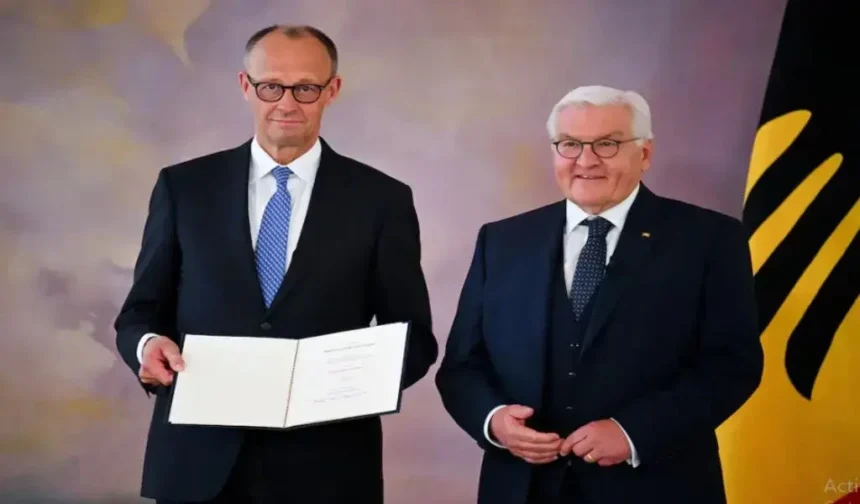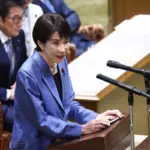(CTN News) German conservative leader Friedrich Merz was voted chancellor by parliament on Tuesday after an embarrassing and unprecedented first defeat, ending a tumultuous start to his coalition government.
Merz, 69, earned 325 votes in the secret ballot, nine more than the absolute majority needed. Friedrich Merz forged an alliance with the center-left Social Democrats (SPD) and led his conservative party to victory in the February federal election.
Despite 310 first-round votes, he claimed 18 weak coalition MPs.
Political commentators believe that Europe’s reliance on Germany for strong leadership could exacerbate distrust among coalition members and underscore the fragility of their cooperation.
Jana Puglierin, president of the Berlin office of the European Council on Foreign Relations think tank, stated that “all of Europe was watching Berlin today, waiting for Germany to reaffirm its role as a bulwark of stability and a pro-European force.” With repercussions that extend well beyond our boundaries, that objective has been achieved.
Europe is acting swiftly to get a trade agreement with the United States and to provide Ukraine with security guarantees that would be part of any peace agreement with Russia in response to President Donald Trump declaring large tariffs. This is when Friedrich Merz steps in.
The biggest economy in Europe, Germany, is experiencing tax-related losses for the third consecutive year. Ukraine has experienced a scarcity of affordable Russian gas and increased competition from China since Russia’s full-scale invasion of the nation in 2022.
The German coalition agreement seeks to stimulate the economy by reducing energy prices and corporate taxation. It also promised to increase the military budget and provide Ukraine with robust assistance.
On X, Ukrainian President Volodymyr Zelenskiy stated,
“We sincerely expect deep German leadership in transatlantic and European affairs.” This is crucial for Europe’s future.
At the now-defunct Bellevue Palace, President Frank-Walter Steinmeier formally nominated Friedrich Merz as Germany’s eleventh chancellor since the conclusion of World War Two after Tuesday’s vote. He then returned to the former Reichstag building to take the oath of office.
In order to demonstrate Germany’s comeback to the global arena after the fall of the last SPD-led government in November, he will visit France and Poland on Wednesday. The February election follows months of negotiations.
Unsettling start
Friedrich Merz’s initial candidacy for the chancellorship failed to garner support for the first time in post-war Germany.
Party sources asserted on Monday that he would swiftly win a majority in response to criticism from both coalition parties on cabinet selections, policy concessions, and a substantial borrowing package that the outgoing parliament hurriedly approved in its last days.
Support for the two coalition parties has declined since their already poor performance in February, despite campaign promises to maintain fiscal restraint. This is primarily due to dissatisfaction with Friedrich Merz’s decision to loosen borrowing limits, which was characterized by a harsh and inconsistent approach, particularly among the conservative CDU/CSU bloc.
“Due to the confidentiality of the votes, the official reason for the unsuccessful first round this morning remains undisclosed,” said Carsten Brzeski, Global Head of Macro at ING Research. After the elections, a number of CDU/CSU MPs appeared to express their unmistakable disapproval of Friedrich Merz’s altered financial plans.
“The far-right, anti-establishment Alternative for Germany (AfD), which finished second in February and has dominated several recent polls, only benefited from Tuesday’s disaster,” said Manfred Guellner, a pollster with Forsa.
He stated, “Confidence in political institutions is progressively waning.”
Analysts say Merz’s choice for the cabinet shows a desire for change in the face of deteriorating systemic trust and a preference for knowledge over political influence.
Boris Pistorius, the defense minister, is the only former cabinet member still in office. Several recently appointed cabinet members, including the minister of economy, have relevant experience in their respective disciplines from the private sector.
Several European organizations anticipate that Friedrich Merz, a seasoned politician who was first elected as a European representative in 1989, will be more committed to European unification than Social Democrat Olaf Scholz, his predecessor.
In his X statement, French President Emmanuel Macron wrote, “Congratulations on your investiture, esteemed Chancellor Friedrich Merz.” We must ensure that cooperative decision-making and the Franco-German alliance are more successful than they were previously.
SOURCE: TN
SEE ALSO:
Spain Power Outage Leaves Millions Stranded, Phones Quit Working
Massive Power Outages in Spain and Portugal Leave Millions Without Electricity.
Vancouver Police Charge Man for Killing 9 People at Filipino Festival















